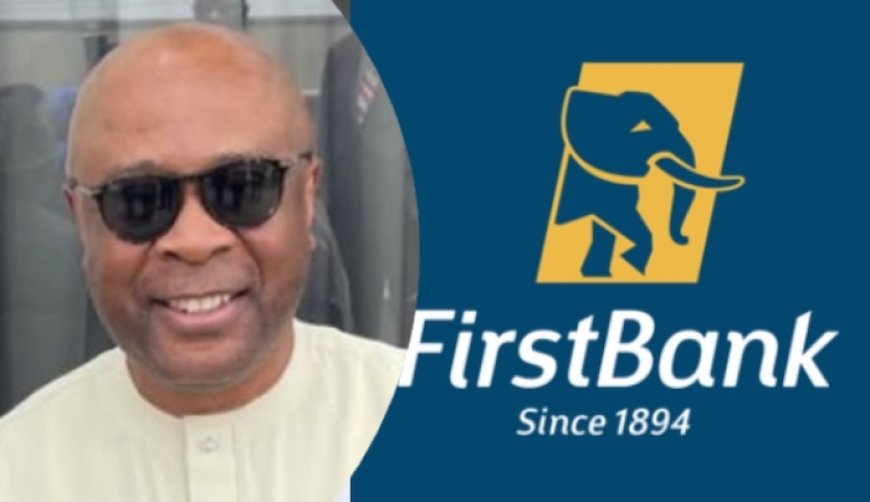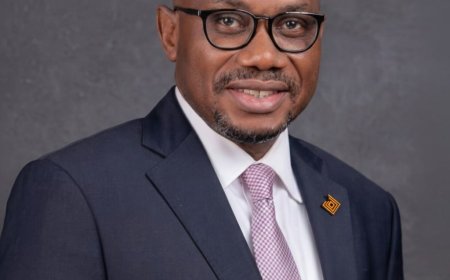Fraud Scandal Rocks FirstBank as Dr. Eke Agbai Sues Over Missing ₦550 Million Fixed Deposit
FirstBank is at the center of a financial scandal as Dr. Eke Agbai files a lawsuit over a missing ₦550 million fixed deposit. Read the full details on this developing case.

The Troubling Disappearance of a Massive Fixed Deposit
The Nigerian banking sector has been rocked by a major fraud scandal, with prominent businessman Dr. Eke Agbai taking legal action against FirstBank Nigeria Limited over the alleged disappearance of his ₦550 million fixed deposit. This shocking revelation has sent shockwaves through the industry, raising serious concerns about the integrity of bank staff and the strength of internal financial controls.
According to Dr. Agbai, he had deposited the substantial sum with the bank under a fixed-term agreement, only to discover that the funds were no longer available when he attempted to make a withdrawal. Despite repeated attempts to seek clarification from the bank's management, no satisfactory explanation was provided, forcing him to escalate the matter through legal channels.
This case is not an isolated incident, but rather part of a troubling pattern of fraudulent activities within financial institutions in Nigeria. Insider sources allege that high-ranking officials within the bank may have been involved in a systematic scheme to divert customer funds, a practice that has become all too common in the country's banking sector.
MORE NEWS: How Nonpayment of Debts Undermines Your Integrity And Cripples Economies
The Systemic Issue of Banking Fraud in Nigeria
The disappearance of Dr. Agbai's substantial fixed deposit has shone a spotlight on the broader problem of banking fraud in Nigeria. This issue is not new, as the country has long grappled with a range of fraudulent practices within the financial system, from the diversion of customer funds to the manipulation of account balances to facilitate visa applications.
One common tactic employed by unscrupulous bank staff is the practice of temporarily inflating the account balances of customers who are seeking to apply for visas. These individuals, often looking to travel abroad, may not have sufficient funds in their accounts to meet the visa requirements. Corrupt bank employees will then transfer money from other customer accounts into the applicant's account, creating the illusion of financial stability. Once the visa is obtained, the funds are quickly withdrawn, leaving the original account holder none the wiser.
This practice not only undermines the integrity of the banking system but also puts innocent customers at risk of having their funds misappropriated. The fact that such schemes can occur with apparent ease raises serious questions about the effectiveness of the country's financial oversight mechanisms and the ability of regulatory bodies to curb these fraudulent activities.
The Broader Implications of the FirstBank Scandal
The FirstBank scandal has far-reaching implications that extend beyond the immediate case. The disappearance of Dr. Agbai's ₦550 million fixed deposit has prompted calls for a comprehensive audit of the bank's financial records, with many wondering how such a colossal sum could vanish without a trace.
Legal experts suggest that if the allegations against the bank's staff are proven true, the consequences could be severe, not only for the accused individuals but also for the reputation of FirstBank as a whole. The Central Bank of Nigeria (CBN) and other financial regulatory bodies have been urged to monitor the situation closely, as the case may serve as a test of the country's ability to effectively oversee and safeguard the banking sector.
Moreover, the scandal has shaken the confidence of FirstBank's customers, who are now questioning the safety of their own deposits. This erosion of trust in the banking system could have far-reaching implications, potentially leading to a broader exodus of funds from financial institutions and a reluctance to engage with the formal banking sector.
- The Need For Private Investigators To Review AMCON'S Operations Over The Last Decade
- How Non Payment Of Your Debt Affect Your Integrity
- Strengthening Fight Against Financial Fraud in Nigeria
- Understanding The Dangers of Financial Fraud And How To Stay Clean
- Strengthening Public Trust In Law Enforcement Agencies in Nigeria
Calls for Increased Transparency and Stronger Anti-Fraud Measures
The FirstBank scandal has reignited calls for increased transparency and stronger anti-fraud measures within the Nigerian banking sector. Customers and industry observers alike are demanding that financial institutions take concrete steps to protect depositors and restore public confidence in the system.
-
Strengthening internal controls and auditing procedures to identify and prevent fraudulent activities
-
Implementing robust customer identification and verification processes to mitigate the risk of account manipulation
-
Enhancing data security and monitoring systems to detect and respond to suspicious transactions in a timely manner
-
Increasing the transparency of financial reporting and making it easier for customers to access information about their accounts and the bank's operations
-
Collaborating with regulatory bodies to develop and enforce stricter regulations and penalties for banking fraud
Dr. Agbai's legal team has vowed to pursue the matter to its logical conclusion, stating that justice must be served. They have emphasized that this case is not just about their client's missing funds, but about restoring trust in the banking sector as a whole.

The Role of Regulatory Oversight
The FirstBank scandal has also highlighted the critical role of regulatory oversight in the Nigerian banking sector. The Central Bank of Nigeria (CBN) and other financial regulatory bodies have a responsibility to closely monitor the activities of banks and ensure that appropriate safeguards are in place to protect customer deposits.
In the wake of this incident, there are calls for the CBN to conduct a thorough investigation into the bank's operations and financial controls. This could involve a comprehensive audit of the bank's records, as well as an examination of the internal processes and procedures used to manage customer accounts and deposits.
Moreover, the regulatory bodies must take decisive action to hold the responsible parties accountable. If the allegations of fraud and misappropriation of funds are proven true, the CBN should impose severe penalties on the implicated bank staff, including fines, suspensions, or even criminal charges, depending on the severity of the offenses.
Ultimately, the success of this case and the broader response to the banking fraud crisis in Nigeria will serve as a test of the country's financial oversight mechanisms. The public will be watching closely to see if the regulatory authorities are willing and able to take the necessary steps to protect the integrity of the banking system and restore public trust.
Conclusion: Restoring Trust in the Nigerian Banking Sector
The FirstBank fraud scandal is a stark reminder of the deep-rooted issues plaguing the Nigerian banking sector. The disappearance of Dr. Agbai's substantial fixed deposit has exposed the vulnerability of customer funds and the apparent ease with which unscrupulous bank staff can divert and misappropriate these assets.
This case is not an isolated incident, but rather part of a broader pattern of fraudulent activities that have eroded public confidence in the country's financial institutions. The Nigerian government and regulatory bodies must take decisive action to address this crisis, implementing robust anti-fraud measures and holding those responsible accountable for their actions.
Restoring trust in the banking sector will be a challenging and long-term endeavor, but it is a necessary step to ensure the stability and integrity of the country's financial system. By prioritizing transparency, strengthening internal controls, and enhancing regulatory oversight, Nigeria can work towards a future where customers can feel secure in entrusting their hard-earned savings to the banking system.
The FirstBank scandal serves as a wake-up call for the industry and the government alike. It is time to confront the issue of banking fraud head-on and take the necessary steps to protect the financial well-being of all Nigerians. Only then can the country's banking sector truly regain the trust and confidence of the people it serves.

From Probitas Report Advisory Board:
Dr. Ohio O. Ojeagbase, a globally recognized authority in financial fraud prevention, integrity in business cultiure, corporate governance, and debt recovery management, emphasizes that internal fraud in Nigerian banks is a critical challenge that demands urgent and strategic intervention. He asserts that financial institutions must deploy proactive risk assessment frameworks to curb fraudulent activities before they escalate. One of the most effective solutions is leveraging Kreeno's RiskHR and EmoRisk, cutting-edge tools designed to prevent, detect, and mitigate financial fraud by analyzing employee behavioral patterns, psychological vulnerabilities, and financial stress indicators. According to Dr. Ojeagbase, integrating AI-driven risk analytics with real-time monitoring enables banks to identify internal threats early, reducing financial losses and reputational damage. He further recommends strengthening internal controls, implementing whistleblower protection programs, and fostering a culture of transparency and accountability. By adopting these measures, banks can reinforce their defenses against insider fraud and ensure long-term financial integrity.
Kindly share this story:
Contact: report@probitasreport.com
Stay informed and ahead of the curve! Follow The ProbitasReport Online News Report on WhatsApp for real-time updates, breaking news, and exclusive content especially when it comes to integrity in business and financial fraud reporting. Don't miss any headline – and follow ProbitasReport on social media platforms @probitasreport
[©2025 ProbitasReport - All Rights Reserved. Reproduction or redistribution requires explicit permission.]
What's Your Reaction?





































































































